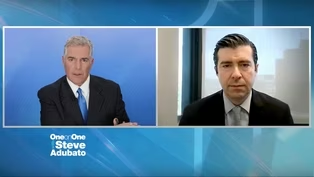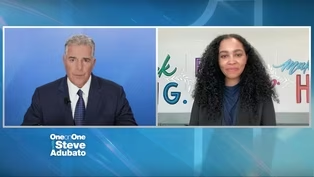One-on-One
How The Kessler Foundation is Improving Patient Care
Clip: Season 2024 Episode 2735 | 8m 10sVideo has Closed Captions
How The Kessler Foundation is Improving Patient Care
Steve Adubato and One-on-One Correspondent Mary Gamba are joined by Brian Sandroff, PhD, Assistant Director, Center for Neuropsychology and Neuroscience Research at Kessler Foundation, who discusses advancing patient care through innovation and research.
Problems playing video? | Closed Captioning Feedback
Problems playing video? | Closed Captioning Feedback
One-on-One is a local public television program presented by NJ PBS
One-on-One
How The Kessler Foundation is Improving Patient Care
Clip: Season 2024 Episode 2735 | 8m 10sVideo has Closed Captions
Steve Adubato and One-on-One Correspondent Mary Gamba are joined by Brian Sandroff, PhD, Assistant Director, Center for Neuropsychology and Neuroscience Research at Kessler Foundation, who discusses advancing patient care through innovation and research.
Problems playing video? | Closed Captioning Feedback
How to Watch One-on-One
One-on-One is available to stream on pbs.org and the free PBS App, available on iPhone, Apple TV, Android TV, Android smartphones, Amazon Fire TV, Amazon Fire Tablet, Roku, Samsung Smart TV, and Vizio.
Providing Support for PBS.org
Learn Moreabout PBS online sponsorship(upbeat music) - Recently, together with my colleague on Lessons in Leadership, Mary Gamba, we interviewed a fascinating researcher up at Kessler Foundation, Dr. Brian Sandroff, who's the Assistant Director of the Center for Neuropsychology and Neuroscience Research.
Important work being done, important research, part of our series on discovery and innovation in New Jersey.
Let's check it out.
Good to see you, doctor.
- You too, Steve.
Nice to see you, Mary.
I hope allergies aren't too bad today.
- No, we're hanging in.
Hey Brian, tell everyone what the center is while we put up the website for Kessler Foundation.
- So our center focuses on research that looks at cognition in people with neurological disorders, such as multiple sclerosis, traumatic brain injury, are the two primary disorders that we study.
But we look at different predictors of cognitive performance.
We look at different treatments for cognitive impairment.
As well as a number of other intervention related approaches to see if we can make people who have MS or TBI live a better life.
Before Mary jumps in, talk about how you were led to this field and why it matters so much to you and the colleagues at the center.
- So funny story actually is that it happened by accident.
So I was in undergraduate at University of Illinois at Urbana-Champaign in the middle of nowhere Illinois.
And I was a pre-med major and turned out that that wasn't the greatest decision I ever made, considering that I was pretty bad at molecular genetics and biology, but I was always a big sports fan.
So I switched to kinesiology, which is the study of human movement.
It is kind of an intersection between sports and science.
And the first course I took, which was Intro to Sports Psychology, ended up being not at all about sports psychology, but instead about how to answer a research question from a randomized controlled trial point of view, and I was hooked.
And I went up to the professor after and said, "Hey, how do I get involved in this?
This is the coolest thing ever."
And he said, "Well, why don't you work in my lab?"
I said, "Okay, do you have an opening next semester?"
And he said, "No, I have an opening tomorrow."
And his lab was all about measuring physical activity, applying physical activity in people with multiple sclerosis.
So my undergraduate training, my master's training, my doctoral training, and then even my postdoctoral training has all been about examining exercise as a way to improve brain health in people with MS. And just recently, as part of the Center for Neuropsychology and Neuroscience at Kessler Foundation, have expanded to look at other populations, like traumatic brain injury and people with stroke, just very recently.
- Fascinating, again, the website will be up to find out more about Kessler Foundation and the center.
Mary, please, - Brian, Steve and I talk a lot about wellness and leadership and I'm hearing you talk about your own personal innovation and how that innovation has really helped patients.
Can you tie that back to wellness?
What is the connection in your mind between wellness, leadership, and innovation, and improving the lives of the patients that you're treating every day?
- Nice thing about physical activity as a treatment for all sorts of symptoms and consequences of neurological disorders is that patients can do it themselves.
They may need a little bit of guidance in terms of what to do, how to do it, how often to do it, how intense exercise or physical activity should be to get beneficial effects.
But at the end of the day, us as researchers, we're looking to put ourselves out of business, really, where we would love to have people who present with symptoms of MS and TBI be able to engage in physical activity based on guidelines where they can self-manage their disease and they can live better.
- Hold on, Brian, do me a favor, Brian, go back.
TBI, you use that acronym a lot that, that's traumatic brain injury?
- Correct, sorry, I didn't define that.
- That's okay.
- Yes.
Traumatic brain injury.
And I mean, we're all interested in this area where we can continue to come up with research questions that help people that, at more precise approaches, such as who benefits the most from exercise, what intensity of exercise or doses is the right dose for specific benefits.
But in terms of our leadership, we are absolutely committed to providing the highest quality research that helps the most people.
And we're also very competitive, is, that's really the standard we hold ourselves to, is how can we help the most people?
- Hold on Brian, competitive against whom?
With whom?
- Ourselves.
With ourselves.
- Mary, isn't that interesting?
An internal competition to help others.
I've never heard it put that way, but I'm curious about this.
Since we talk an awful lot about leadership Do you see yourself, as a researcher/scientist, as a leader?
- Sort of, so I don't really see myself personally as someone who needs to be a mouthpiece for things.
But I consider our work to be leading the field as we are always on the forefront.
We're trying to ask the tough questions, we're trying to do things the right way, which sometimes can seem pretty incremental, but at the end of the day, that's how you generate really strong evidence that ends up helping people as opposed to shooting first, asking questions later.
- I think, Mary, would you disagree?
'Cause Brian framed it about speaking up.
You and I have this discussion all the time about what leadership really is and sometimes it's not the person who's clearly the loudest in the room.
Final question, Mary?
- Exactly.
Brian, I was just gonna do a bridge from that because I picked up on that as well.
What do you believe is your role as a leader, bringing other people up at Kessler Foundation?
What do you see as your role, leading, coaching, mentoring others on your team?
- So I see two things primarily.
First, getting people excited about what we do.
Getting people to buy in to what we do.
And then second, I believe that once that buy-in is established, people hold themselves to a really high standard because they always understand what it is they're trying to do and why it's important.
And if they can do those two things or even speak about them in a seminar or in a presentation, I think they're doing a good job.
- Brian, thank you for joining us.
We really appreciate it.
But I do want to disagree with you.
You are, and your colleagues are, leaders.
You just are.
I've known and worked with you and your colleagues for a long time.
You're making a difference and helping other people and leading the way in that regard.
Dr. Brian Sandroff.
Thanks Brian.
Thanks for joining us.
- Thanks, Steve.
Thank you, Mary.
Have a great rest of your day.
- You got it.
Stay with us, we'll be right back.
- [Narrator] One-On-One with Steve Adubato is a production of the Caucus Educational Corporation.
Celebrating 30 years in public broadcasting.
Funding has been provided by The Healthcare Foundation of New Jersey.
The Turrell Fund, a foundation serving children.
Rowan University.
Citizens Philanthropic Foundation.
PSE&G, Johnson & Johnson.
NJM Insurance Group.
Horizon Blue Cross Blue Shield of New Jersey.
And by The Port Authority of New York and New Jersey.
Promotional support provided by CIANJ, and Commerce Magazine.
And by NJBIZ.
- NJM Insurance Group has been serving New Jersey businesses for over a century.
As part of the Garden State, we help companies keep their vehicles on the road, employees on the job and projects on track, working to protect employees from illness and injury, to keep goods and services moving across the state.
We're proud to be part of New Jersey.
NJM, we've got New Jersey covered.
NJEDA CEO Examines The Booming Film Industry in New Jersey
Video has Closed Captions
Clip: S2024 Ep2735 | 9m 34s | NJEDA CEO Examines The Booming Film Industry in New Jersey (9m 34s)
This Organization Is Empowering Survivors of Domestic Abuse
Video has Closed Captions
Clip: S2024 Ep2735 | 10m 7s | This Organization Is Empowering Survivors of Domestic Abuse (10m 7s)
Providing Support for PBS.org
Learn Moreabout PBS online sponsorship
- News and Public Affairs

Top journalists deliver compelling original analysis of the hour's headlines.

- News and Public Affairs

FRONTLINE is investigative journalism that questions, explains and changes our world.












Support for PBS provided by:
One-on-One is a local public television program presented by NJ PBS

